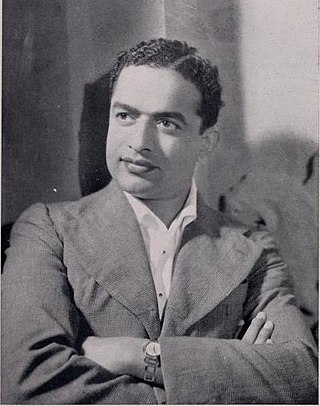
Shantaram Rajaram Vankudre, referred to as V. Shantaram or Shantaram Bapu, was an Indian filmmaker, film producer, and actor known for his work in Hindi and Marathi films. He is most known for films such as Dr. Kotnis Ki Amar Kahani (1946), Amar Bhoopali (1951), Jhanak Jhanak Payal Baaje (1955), Do Aankhen Barah Haath (1957), Navrang (1959), Duniya Na Mane (1937), Pinjara (1972), Chani, Iye Marathiche Nagari and Zunj.
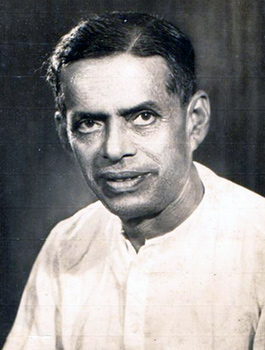
Ramchandra Gopal Torne, also known as Dadasaheb Torne was an Indian director and producer, best known for making the first feature film in India, Shree Pundalik. This historic record is well established by an advertisement in The Times of India published on 25 May 1912. Several leading reference books on cinema including The Guinness Book of Movie Facts & Feats, A Pictorial History of Indian Cinema and Marathi Cinema : In Restrospect amply substantiate this milestone achievement of the pioneer Indian feature-filmmaker.

Marathi cinema is an Indian film industry of Marathi-language motion pictures. It is based in Mumbai,Pune Maharashtra. Film Production in Mumbai, Pune. It is the oldest film industry of Indian cinema. The first Marathi film to be released in India was Shree Pundalik by Dadasaheb Torne on 18 May 1912 at Coronation Cinematograph, Mumbai. and a Marathi crew who were performing Marathi and Sanskrit Sangeet natikas (musicals) and plays in Marathi at that period.

Sai Parānjpye is an Indian movie director and screenwriter. She is the director of the award-winning movies Sparsh, Katha, Chasme Buddoor and Disha. She has written and directed many Marathi plays such as Jaswandi, Sakkhe Shejari, and Albel.

Dinkar D. Patil (1915–2005) was a prominent Marathi film director, scriptwriter, and dialogue writer during the Golden Era (1950–1990) of the Marathi Film Industry. He directed, wrote scripts and dialogue for more than 60 Marathi films. He also directed two Hindi Films-Mandir and Gharbar. He wrote his famous autobiography titled as Patlache Por.

Pinjara is a 1972 Indian Marathi-language film directed and produced by V. Shantaram, starring Shriram Lagoo and Sandhya in the lead roles. In 1972, the film was also released in Hindi with the same title.

Shree Pundalik, which was released on 18 May 1912 at the Coronation Cinematograph, Girgaum, Mumbai, is sometimes considered the first feature-length Indian film by a minority. The government of India and most scholarly sources consider Raja Harishchandra to be the first Indian feature film, and detractors argue Pundalik was only a photographic recording of a popular play. It was produced and directed by Dadasaheb Torne.
Chhatrapati Shivaji Maharaj, was a Hindu warrior king and was the founder of the Maratha Empire in India. He has been considered a prominent historical figure in India. A number of films, books, plays and television serials have been produced about his life and about figures associated with him.
Anant Mane (1915-1995) was a film director from Kolhapur, Maharashtra, India who directed approximately 60 movies during the golden era of Marathi cinema. He was known for making films based on the folk art form Tamasha, and also directed a number of family melodramas. He teamed up with the music director Vasant Pawar and directed several hit movies in the 1960s, 1970s and 1980s.

Ram Kadam was a noted Indian lavani composer and film score composer, who worked in Marathi cinema, during the 1940s to the 1990s, composing for nearly 200 films. He is most known for composing Lavani songs, a folk form of Maharashtra, and popular Lavani-based songs of hit film, Pinjra (1972), directed by V. Shantaram. He also composed music of plays.
Prabhakar Pendharkar (1933–2010) was a Marathi writer. He was the son of film personality and director Bhalji Pendharkar. He worked under his father in the film sector and later in V. Shantaram's studio, Rajkamal. Pendharkar started his writing career with the magazine Deepavali. He also published various novels like Arey Sansar Sansar, Rarang Dhang and Chakrivadal. His long story Pratiksha received an award.
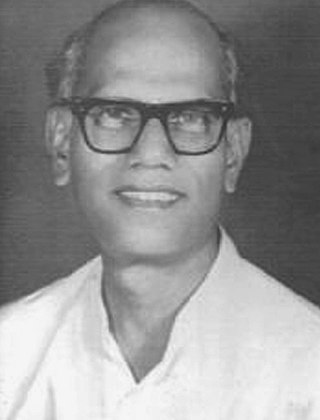
Shantaram Govind Athavale was an Indian director of Marathi, Hindi and English language films, a lyricist, poet, and author. Part of the generation that emerged from the Prabhat Film Company in Pune in the 1930s, he made pioneering contributions to Marathi film.
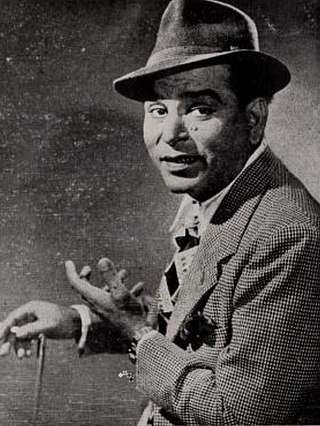
Yakub Khan, known as Yakub, was an Indian actor born into a Pathan family in Jabalpur, Madhya Pradesh, India. He is best known for his comic and comic villainous roles. He began his career with roles as an extra, but eventually was cast in more important roles, frequently playing the parts of heroes and villains. He became one of the most renowned screen villains, while achieving equal success in comedy and character roles. Yakub appeared in over 100 films.
Hind Mahila also called Woman's Challenge is a 1936 Hindi social film directed by Premankur Atorthy. It was produced by Kolhapur Cinetone. Premankur Atorthy Moved from New Theatres and worked for Kohlapur Cinetone making Bhikharan and Hind Mahila for them before going to Imperial Film Company. The music direction was by H. C. Bali. The cast included Rattan Bai, Shahu Modak, Master Vithal, and Hafisji.
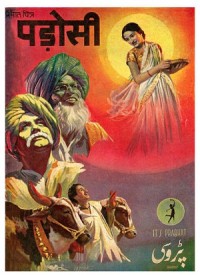
Shejari is also known as Padosi in Hindi version as. Padosi is a 1941 Indian social drama film directed by V. Shantaram. It was produced by Prabhat Film Company and the bilingual film in Marathi and Hindi was the last film Shantaram made for Prabhat before venturing to form his Rajkamal Kalamandir. The film is cited as one of the three social classics Shantaram made at Prabhat. The other two were Duniya Na Mane (1937) and Aadmi (1939). The story and dialogue were by Vishram Bedekar in the Marathi version, while the dialogues in the Hindi version were by Pandit Sudarshan, who also wrote the lyrics. The music director was Master Krishnarao. The famous character artist Radhakrishan made his acting debut in the film as a villain. The film starred Mazhar Khan, Gajanan Jagirdar, Anees Khatoon, Radha Kishan, Lajwanti, Sumitra, Gopal and Balak Ram.
Khooni Khanjar is a 1930 Indian silent film directed by V. Shantaram. The film was a costume action drama film co-directed by Keshavrao Dhaiber. It was produced by Prabhat Film Company. The cinematography was by Sheikh Fattelal and Vishnupant Govind Damle. The cast included Mane Pahelwan, Ganpat G. Shinde, P. Jairaj, Sakribai and Shankarrao Bhosle.

Lokshahir Ram Joshi also called Matawala Shair Ram Joshi in Hindi, is a 1947 Marathi biopic film of the poet Ram Joshi, written by G. D. Madgulkar, directed by Baburao Painter and co-directed by V. Shantaram. Shantaram had given the direction to Painter but had to complete the film when Painter fell ill during production. Produced under the Rajkamal Kalamandir banner, it is also referred to as Lok Shahir Ramjoshi. The story writer was G.D. Madgulkar, who is cited as the "first specialist film writer" in Marathi cinema. This film was his first "full-fledged writing assignment", wherein he wrote the story, screenplay, dialogue and lyrics. It was also his debut as a screenplay writer. The film starred Jayaram Shiledar as Ram Joshi and Hansa Wadkar as Baya. The rest of the cast included Shakuntala Paranjpye, Parashuram, Sudha Apte and G. D. Madgulkar.

Chaturbhuj Doshi (1894–1969) was a Hindi and Gujarati writer-director of Indian cinema. He was one of the top Gujarati screenplay writers, who helped script stories for the Punatar productions. He is stated to be one of the leading figures who launched the Gujarati film industry with work on notable films like Gunsundari (1948) and Nanand Bhojai (1948). Doshi, was “well known” for his family socials and had become “a celebrity in his own right”. He made a name for himself as a journalist initially and was referred to as the "famous journalist" and publicist by Baburao Patel, editor of Filmindia.

Mukhram Sharma was an Indian film lyricist, script, and story writer. He is best known for winning the first Filmfare Award in the Best Story category in 1955 for the film Aulad. His notable works as story writer include Vachan (1955), Sadhna (1958), Talaq (1958) and Dhool Ka Phool (1959). He also produced films like Talaq (1958), Santaan, and Diwana (1967).
Vasant Joglekar (1914–1993) was a film director and producer. He directed several Marathi and Hindi movies, including Aanchal and Aaj Aur Kal.













